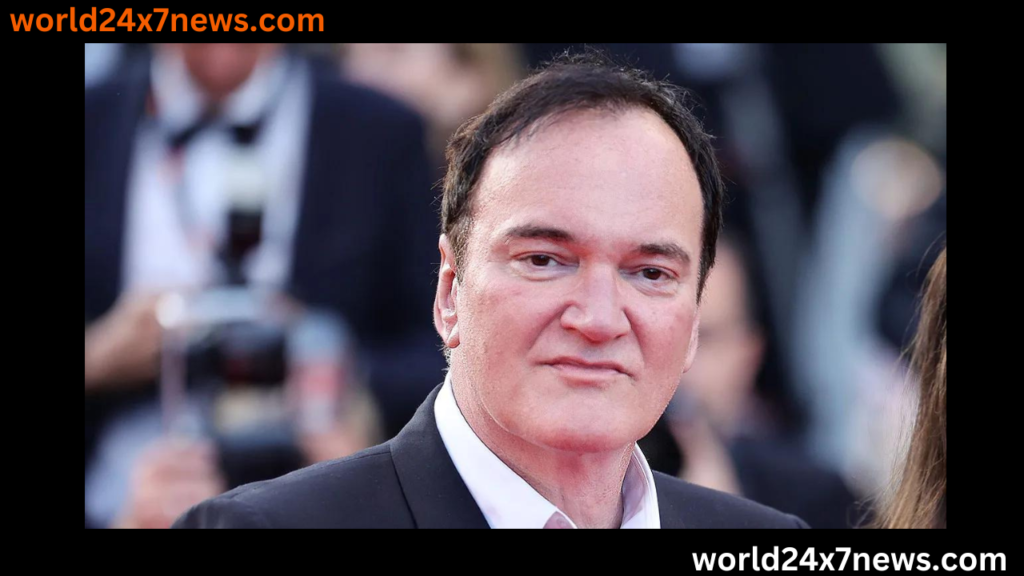Introduction
Quentin Tarantino is one of our time’s most influential and controversial filmmakers. Born on March 27, 1963, in Knoxville, Tennessee, Tarantino’s journey from a video store clerk to an Oscar-winning director has left an indelible mark on the world of cinema.
Early Life and Career Beginnings
Growing up in Los Angeles, Tarantino was exposed to the vibrant world of filmmaking from a young age. His love for movies blossomed as he devoured various genres, from spaghetti westerns to blaxploitation films. Despite dropping out of high school, Tarantino’s passion for cinema remained unwavering, eventually leading him to pursue a career in the industry.
Breakthrough with “Reservoir Dogs”
Tarantino burst onto the scene in 1992 with his electrifying debut, “Reservoir Dogs.” Shot on a shoestring budget, the film captivated audiences with its razor-sharp dialogue, non-linear narrative, and ensemble cast. Though initially divisive, “Reservoir Dogs” garnered critical acclaim and laid the groundwork for Tarantino’s future success.
Cinematic Style and Signature Techniques
Tarantino’s cinematic style is characterized by its boldness, wit, and unapologetic homage to pop culture. From the frenetic energy of “Pulp Fiction” to the blood-soaked revenge tale of “Kill Bill,” Tarantino’s films are a masterclass in style and substance. His penchant for nonlinear storytelling, memorable dialogue, and eclectic soundtracks has earned him a legion of devoted fans.
Career Milestones: Pulp Fiction
“Pulp Fiction,” released in 1994, solidified Tarantino’s status as a visionary filmmaker. The film’s intertwining narratives, eclectic cast of characters, and clever dialogue redefined the crime genre and earned Tarantino the coveted Palme d’Or at the Cannes Film Festival. “Pulp Fiction” remains a cultural touchstone, inspiring countless imitators and cementing Tarantino’s place in cinematic history.
Tarantino’s Collaborations and Ensemble Casts
Throughout his career, Tarantino has forged close ties with a select actors, resulting in unforgettable performances and memorable collaborations. From Uma Thurman in “Kill Bill” to Samuel L. Jackson in “Django Unchained,” Tarantino’s films are populated by a diverse array of characters brought to life by some of Hollywood’s finest talents.
Controversies and Criticisms
Despite his acclaim, Tarantino has not been immune to controversy. Critics have accused him of glorifying violence, fetishizing women, and appropriating black culture. Tarantino’s unapologetic approach to filmmaking has sparked debates about the ethical boundaries of art and the responsibilities of the artist.
Later Works: Kill Bill, Inglourious Basterds, Django Unchained
In the years following “Pulp Fiction,” Tarantino continued to push the boundaries of cinema with a string of ambitious projects. “Kill Bill” showcased his flair for martial arts and revenge fantasy, while “Inglourious Basterds” reimagined World War II as a gleefully absurd revenge fantasy. “Django Unchained,” meanwhile, tackled America’s dark history of slavery with unflinching honesty and bravado.
The Hateful Eight and Once Upon a Time in Hollywood
“The Hateful Eight,” released in 2015, marked a return to Tarantino’s roots with its claustrophobic setting and ensemble cast. Meanwhile, “Once Upon a Time in Hollywood,” released in 2019, offered a nostalgic love letter to 1960s Los Angeles, complete with a star-studded cast and a revisionist twist on history.
Tarantino’s Influence on Filmmaking
Tarantino’s impact on cinema is undeniable. His bold storytelling, innovative techniques, and unabashed love for film have inspired a new generation of filmmakers to push the boundaries of storytelling. Tarantino’s films have become synonymous with a certain brand of cool, influencing everything from fashion to music to advertising.
Awards and Accolades
Over the course of his career, Tarantino has received numerous awards and accolades, including two Academy Awards for Best Original Screenplay. His films have been celebrated for their boldness, originality, and fearless exploration of taboo subjects.
Quentin Tarantino: Beyond Filmmaking
In addition to his work as a director, Tarantino has made significant contributions to literature and television. His novelizations of “Once Upon a Time in Hollywood” and “The Hateful Eight” have garnered praise for their rich characterizations and vivid storytelling.
Personal Life and Philanthropy
Despite his larger-than-life persona, Tarantino remains notoriously private about his personal life. However, he has been known to lend his support to various charitable causes, including AIDS research and inner-city youth programs.
Future Projects and Retirement Plans
As Tarantino approaches the twilight of his career, fans eagerly anticipate what the future holds for the legendary filmmaker. Though he has hinted at retirement on numerous occasions, Tarantino’s restless creativity suggests that he may have a few more tricks up his sleeve before hanging up his director’s hat for good.
Conclusion
Quentin Tarantino is a true maverick of modern cinema, a filmmaker whose bold vision and uncompromising style have left an indelible mark on the medium.
